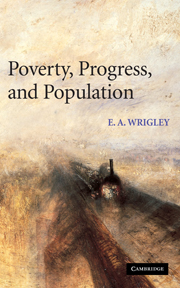Book contents
- Frontmatter
- Contents
- List of figures
- List of tables
- Acknowledgements
- Introduction
- PART I The wellsprings of growth
- PART II Town and country
- 9 City and country in the past: a sharp divide or a continuum?
- 10 ‘The great commerce of every civilized society’: urban growth in early modern Europe
- 11 Country and town: the primary, secondary, and tertiary peopling of England in the early modern period
- PART III The numbers game
- Bibliography
- Index
10 - ‘The great commerce of every civilized society’: urban growth in early modern Europe
Published online by Cambridge University Press: 23 December 2009
- Frontmatter
- Contents
- List of figures
- List of tables
- Acknowledgements
- Introduction
- PART I The wellsprings of growth
- PART II Town and country
- 9 City and country in the past: a sharp divide or a continuum?
- 10 ‘The great commerce of every civilized society’: urban growth in early modern Europe
- 11 Country and town: the primary, secondary, and tertiary peopling of England in the early modern period
- PART III The numbers game
- Bibliography
- Index
Summary
Book III of the Wealth of nations is entitled ‘Of the different progress of opulence in different nations’. It is very brief, occupying less than 5 per cent of the text of the book. It opens with a ringing declaration about the significance of urban growth to the achievement of higher levels of productivity and increasing wealth which deserves to be read in parallel with the still more celebrated argument of the opening chapters of the first book in which the relationship between the division of labour and the size of the market is examined, and with the early chapters of the second book where the intimate and necessary connection between the division of labour and the growth of the stock of capital is described.
The opening sentences of book III run as follows:
The great commerce of every civilized society, is that carried on between the inhabitants of the town and those of the country. It consists in the exchange of rude for manufactured produce, either immediately, or by the intervention of money, or of some sort of paper which represents money. The country supplies the town with the means of subsistence, and the materials of manufacture. The town repays this supply by sending back a part of the manufactured produce to the inhabitants of the country. The town, in which there neither is nor can be any reproduction of substances, may very properly be said to gain its whole wealth and subsistence from the country. We must not, however, upon this account, imagine that the gain of the town is the loss of the country. […]
- Type
- Chapter
- Information
- Poverty, Progress, and Population , pp. 268 - 289Publisher: Cambridge University PressPrint publication year: 2004



